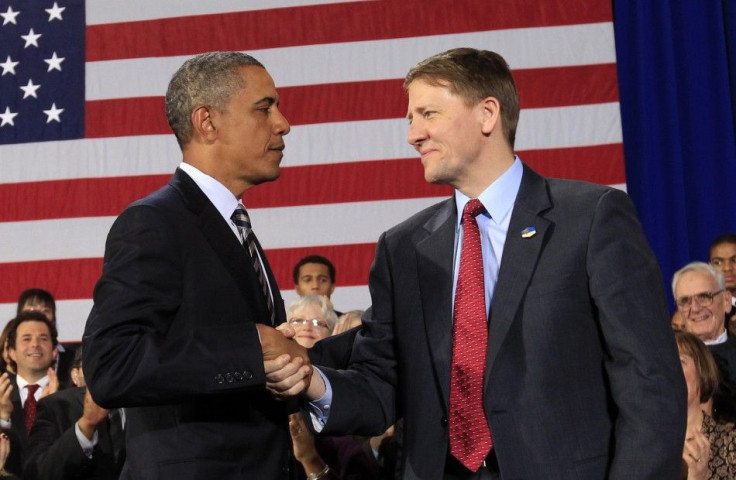Obama Administration Says Richard Cordray Appointment Legal

Updated with comment
U.S. Department of Justice lawyers have laid out the rationale for President Barack Obama's controversial recess appointments in the face of criticism from Republicans who called the move a power grab that put these officials on shaky legal ground.
Noting that the appointments could spark litigation, the Justice Department's Office of Legal Counsel backed Obama's decision in early January to install Richard Cordray as chief of the Consumer Financial Protection Bureau and three new members to the National Labor Relations Board -- all nominees whose confirmations have been held up by Republican senators.
Republicans tried to prevent Obama from making these recess appointments by holding "pro forma" sessions in which no business was conducted and were completed in mere minutes. The idea came from Senate Democrats, who used the tactic to block President George W. Bush's nominees.
Bush never challenged the Senate on this, but Obama administration lawyers essentially said in Jan. 6 memo that these "pro forma" sessions are phony and cannot stop the president from appointing his stalled nominees.
"The Senate could remove the basis for the president's exercise of his recess appointment authority by remaining continuously in session and being available to receive and act on nominations," the 23-page legal memo said, "but it cannot do so by providing for pro forma sessions at which no business is to be conducted."
White House: Senate Not Available for Advice and Consent
The entire idea behind the Senate confirmation process was born from the constitutional authority to give "advice and consent" to the president's nominees. As White House counsel explained in the Jan. 6 memo, the Senate was unable to exercise this authority, opening the door for the recess appointments.
"The president... has discretion to conclude that the Senate is unavailable to perform its advise-and-consent function and to exercise his power to make recess appointments," the memo signed by Assistant Attorney General Virginia Seitz concluded.
"The question is a novel one," the memo continued, "and the substantial arguments on each side create some litigation risk for such appointments."
Senate Minority Leader Mitch McConnell, who had corralled more than 40 senators to oppose the Cordray nomination, said as much after Obama made his appointments. Republican House Speaker John Boehner predicted that a court would find the maneuver around Congress "illegitimate."
Sen. Chuck Grassley, the ranking member of the Senate Judiciary Committee, was unswayed by the Obama administration's legal arguments. Grassley said the appointments fly in the face of previous opinions from White House lawyers stating that recesses must be at least three days.
"The Justice Department and the White House owe it to the American people to provide a clear understanding of the process that transpired and the rationale it used to circumvent the checks and balances promised by the Constitution," Grassley said in a Jan. 6 statement. "Overturning 90 years of historical precedent is a major shift in policy that should not be done in a legal opinion made behind closed doors hidden from public scrutiny."
Despite bipartisan praise for Cordray, a former Ohio attorney general, Republicans had filibustered his confirmation because they wanted changes to the consumer bureau created under the Dodd-Frank financial reform law. The agency's critics in Congress have said it is too powerful and unaccountable to lawmakers.
© Copyright IBTimes 2024. All rights reserved.











